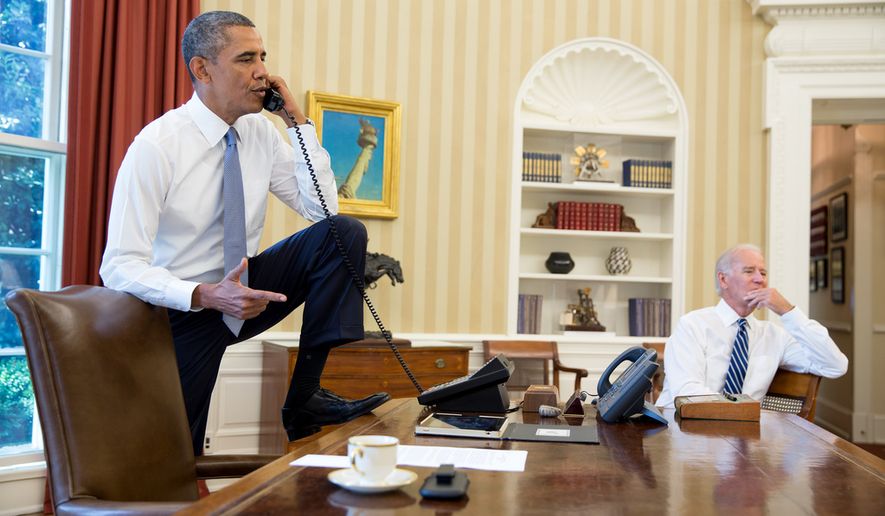Senate Armed Services Chairman John McCain on Tuesday directly questioned President Obama’s competence as the nation’s commander in chief.
At a hearing to examine the White House’s Middle East strategy, Mr. McCain, Arizona Republican, cited Mr. Obama’s failed train-and equip program for moderate Syria rebels fighting the regime of President Bashar Assad. The senator referred to Mr. Obama’s appearance on CBS “60 Minutes” in which he said he was proven right because he never thought the $500 million program would work in the first place. The White House asked for the legislation.
“Harry Truman must be spinning in his grave,” Mr. McCain said of the president whose motto was “the buck stops here.”
“If there is an opposite for Commander in Chief, this is it,” Mr. McCain said.
His statement came as a prelude to testimony from Mr. Obama’s war cabinet, Defense Secretary Aston Carter and Marine Corps. Gen. Joseph Dunford, Joint Chiefs chairman. Gen. Dunford recently toured Iraq to assess the U.S.’s two-prong war policy of bombing the Islamic State terror army while preparing Iraqi ground forces to take back territory.
Mr. Carter told the committee he has changed the counter-Islamic State war under what he calls the three Rs––Raqqa, Ramadi and Raids
The Syrian city of Raqqa is the proclaimed capital of the Islamic State’s “caliphate” stretching from Syria into northern and western Iraq. He said the coalition is conducting more air strikes on Raqqa and is beginning to ship arms to proven Syrian Arab fighters trying to retake the city. Some are just 30 miles away.
Ramadi is the key western Iraq city held by the Islamic State. Iraq government forces have had little luck so far in retaking the town despite U.S. arms, military advisers and overt urging from senior officials to begin an offensive. Mr. Carter suggested that the Shiite-dominated Iraq government is still withholding arms from Sunni tribes who were successful in fighting with the U.S. in 2007-08 to evict al Qaeda in Iraq.
Raids are the use of more direct ground actions against the Islamic State, also known as ISIL and ISIS, by special operations forces, such as the Delta Force team that joined with Kurdish fighters to free prisoners picked for another ISIL mass murder.
The three Rs, Mr. Carter said, “Should help shrink ISIL territory into smaller and smaller areas.”
Gen. Dunford, whose predecessor termed the war against ISIL a “stalemate,” agreed. “No one is satisfied with our progress to date,” he testified.
He said the U.S. is now “accelerating” attacks on ISIL’s economic means, referring specifically to a recent strike on an oil facility which had help the group rake in millions of dollars a month.
On future war plans, he said, the White House wants “all options.”
Mr. McCain pressed Mr. Carter to provide his position on creating safe zones inside Syria to try to stem the greatest refugee crisis since World War II. Mr. Carter refused, except to say he has not yet submitted a plan to the White House.
Mr. McCain also asked the defense secretary if he planned to try to protect pro-U.S. Syrian rebels now being bombed by Russia and Syria with barrel and cluster bombs.
Mr. Carter asserted no rebel group directly supported by the Defense Department under the law has been attacked.
Mr. McCain acted incredulous. Many on-the-ground sources have told monitoring groups that all rebel groups are being hit by Russian air power since it began strikes Sept. 30.
“I promise you they have,” Mr. McCain told Mr. Carter. “You will have to correct the record.”
Mr. Carter was making a fine distinction between groups the Pentagon is designated to back and groups supported by the broader coalitions. The latter are being attacked, he said.
• Rowan Scarborough can be reached at rscarborough@washingtontimes.com.




Please read our comment policy before commenting.